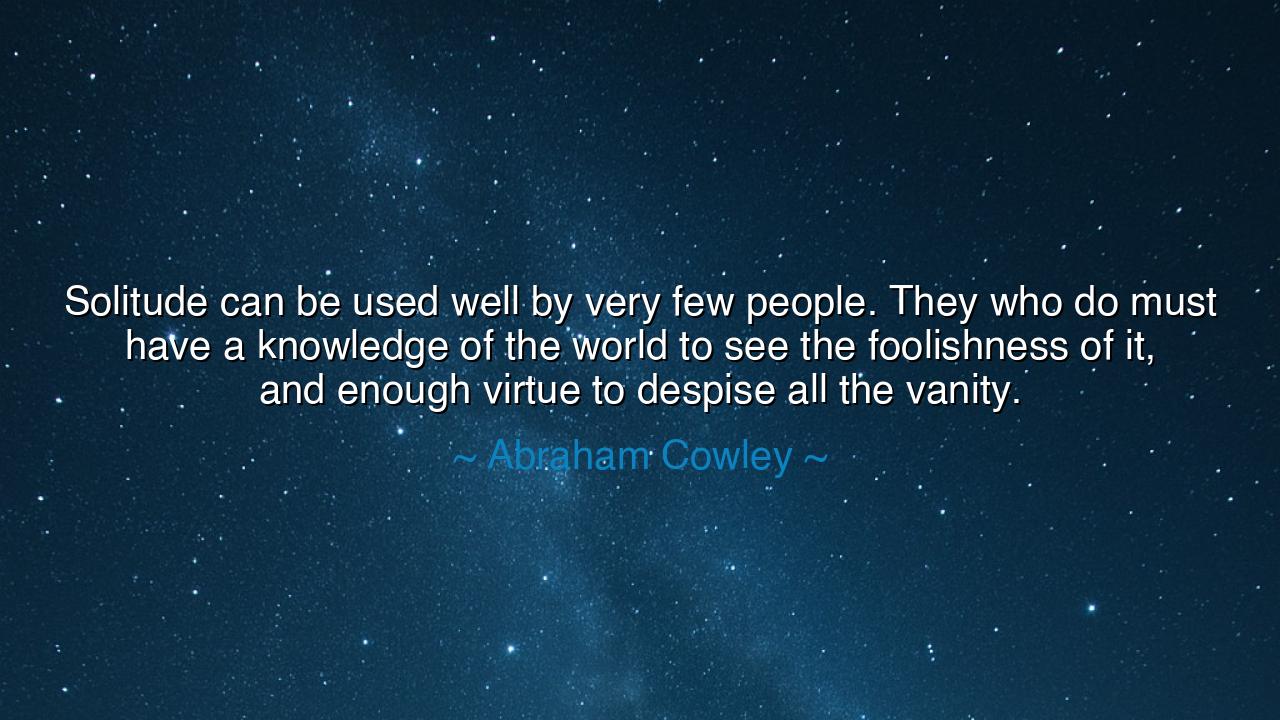
Solitude can be used well by very few people. They who do must
Solitude can be used well by very few people. They who do must have a knowledge of the world to see the foolishness of it, and enough virtue to despise all the vanity.






When Abraham Cowley wrote, “Solitude can be used well by very few people. They who do must have a knowledge of the world to see the foolishness of it, and enough virtue to despise all the vanity,” he was speaking not of loneliness, but of the sacred art of solitude — that rare discipline of the soul through which a person learns to see the world clearly, unclouded by its noise and illusions. Cowley, a poet and philosopher of the seventeenth century, understood that solitude is not escape, but enlightenment. Yet he warned that only the wise can dwell in it without falling into despair or madness, for solitude tests the heart as fire tests gold — burning away the false, revealing the true.
The origin of this reflection lies in Cowley’s own retreat from the chaos of political life in England during the turbulent years of civil war and restoration. He withdrew from courts and controversies to live quietly in the countryside, devoting himself to contemplation and writing. But his solitude was not one of bitterness; it was an act of purification. In the stillness of isolation, he discovered what the ancients had long taught — that the world is filled with vanity, with men chasing wealth, fame, and fleeting honors, while neglecting the eternal. To use solitude well, Cowley realized, one must first know the world’s foolishness and then possess the strength to renounce its glittering temptations.
To “have a knowledge of the world,” as Cowley says, means to see through the masks that men wear. The wise man does not withdraw because he is ignorant of life, but because he has understood it too deeply. He has seen ambition devour integrity, pleasure consume virtue, and pride destroy peace. Knowing this, he turns inward, not in cynicism, but in search of truth. Yet mere withdrawal is not enough. As Cowley teaches, one must also have “virtue to despise all the vanity” — that is, the moral courage to resist the world’s illusions and to live by higher laws. Without virtue, solitude becomes idleness or despair; with it, solitude becomes communion with the divine.
History gives us shining examples of those who used solitude well. Marcus Aurelius, emperor of Rome, ruled an empire yet carried within him the calm of a hermit. In the brief moments of peace between wars, he wrote his Meditations, not for fame, but for the strengthening of his soul. Surrounded by armies and courtiers, he practiced an inner solitude, finding wisdom amid worldly duty. Similarly, Leonardo da Vinci, often secluded from men, turned his solitude into creation — the sketches, the inventions, the art that changed the world. These were not men fleeing life; they were men refining it, seeing clearly the vanity of noise, and turning silence into strength.
But solitude is dangerous to those unprepared. The idle mind, when cut off from the world, becomes its own tormentor. Many who seek solitude hoping for peace find instead the echoes of their own unrest. This is why Cowley says that only a few can use solitude well — for solitude reveals the self, and few are brave enough to face themselves without distraction. To dwell alone requires discipline of mind and purity of heart, for in silence there is no one left to deceive. The weak flee solitude because they fear their own reflection; the strong embrace it because they long to purify it.
Cowley’s wisdom thus holds a mirror to the soul of every age. In the modern world, men and women drown in company, fearing quiet as if it were death. They fill their days with sound and motion, terrified of stillness. Yet true solitude, rightly used, is not emptiness — it is fullness. It is the place where one meets God, where thought matures into wisdom, where love is refined into compassion. The ancients called this the discipline of the hermit or the philosopher’s rest, for in solitude the spirit hears truths that the crowd cannot utter.
Therefore, let this lesson be passed to those who seek peace: do not flee the world before you understand it, and do not despise it before you transcend it. Know its vanity, but also your own weakness within it. Then, when you withdraw, let it be not in weariness, but in awakening. Fill your solitude not with self-pity, but with study, prayer, and reflection. For the soul that uses solitude well becomes luminous — untouched by folly, unmoved by vanity, and at last free. As Abraham Cowley reminds us, solitude is a fire: it consumes the shallow and purifies the wise. Seek it with reverence, and it will make you whole.






AAdministratorAdministrator
Welcome, honored guests. Please leave a comment, we will respond soon